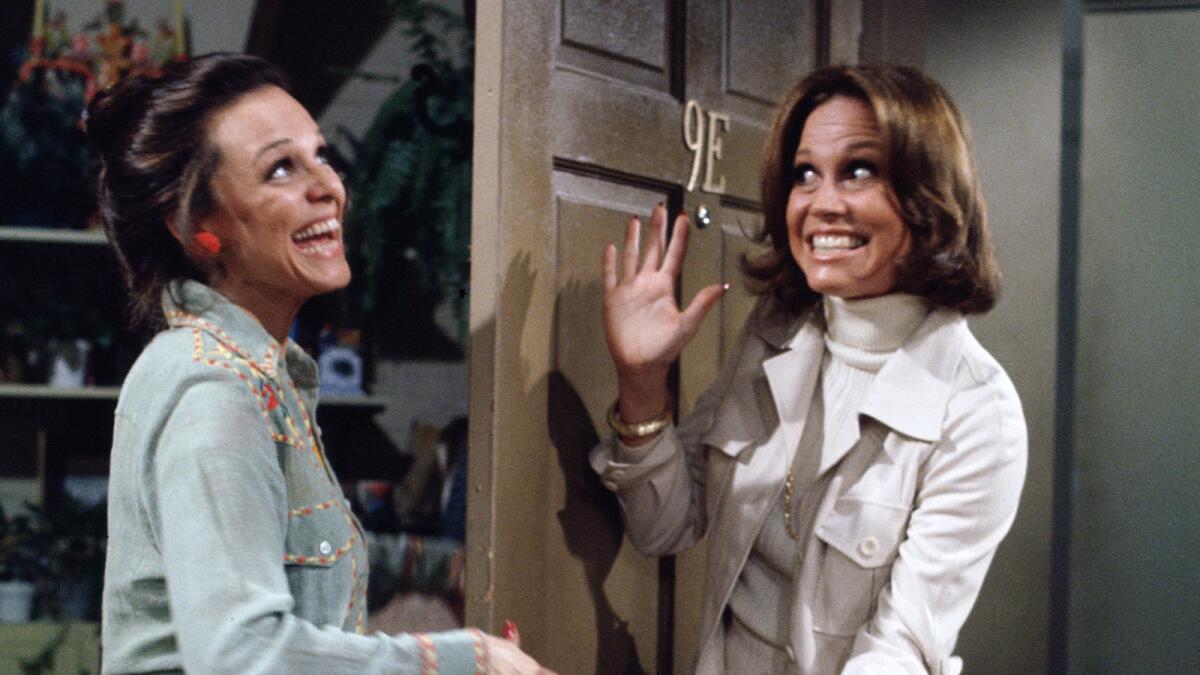Appreciation: Valerie Harper and the timeless cool of Rhoda Morgenstern

- Share via
In 2013, I wrote an appreciation for Valerie Harper. She had been diagnosed with brain cancer and told she had only a few months to live. I was a television critic at the time, but more than that, Rhoda Morgenstern had shaped my life as much as any fictional character since Jo March — and perhaps even more.
I had just turned 7 when “The Mary Tyler Moore Show” premiered, but I knew a woman who could land a joke out of the side of her mouth without blinking when I saw her. Rhoda was, ostensibly, Mary’s sad-sack neighbor turned friend, but that was just a ruse. Mary, the career gal come to the big city, may have been the lead, but Rhoda had all the best lines — “Rhoda, chocolate solves nothing.” “No, cottage cheese solves nothing; chocolate can do it all.” — a deadpan delivery, killer cheekbones, a wardrobe to die for and a bedroom, crowned with an “etc.” plaque, that any young woman would (still) envy. Urban Outfitters, if I am not mistaken, bases at least 80% of its women’s apparel and decor selections on the fashion of Rhoda Morgenstern. (Seriously, check out Rhoda’s clothes rack.)
For the record:
2:09 p.m. Aug. 31, 2019The lead photo on this story was misidentified as being from “The Mary Tyler Moore Show”; it is from “Rhoda.”
11:57 a.m. Aug. 31, 2019An earlier version of this story described Mary Richards as having gone from Minnesota to New York City on “The Mary Tyler Moore Show”; the show was set in Minneapolis, and the character of Rhoda Morgenstern was from New York.
Rhoda was frank, she was loyal, she was smart, and she was hilarious. One of the great door-openers of TV’s last golden — and very dependent on door-opening — age, she often entered a scene with some tale of wry woe. Her job, her love life, her mother, “that Phyllis” (Cloris Leachman). Her life was a mess, a punchline. Whaddya gonna do?
Harper’s Rhoda was everybody’s best friend in the 1970s, the gal pal many faithful fans of “The Mary Tyler Moore Show” wished they had.
But if Rhoda’s jokes were often at her own expense, Harper told them in a way that made it clear Rhoda was only stating the facts and the facts didn’t really bother her that much. An imperfect life was OK too, and if you keep your expectations low, anything good is a wonderful surprise.
Deep down, Rhoda knew she was cool.
In fact, the cottage cheese joke was part of a “tables turned” episode: Mary is having a very bad day while things are going well for Rhoda. But soon, she reassures Mary, things will get back to normal.
“You’re not the crummy-life type ... I am the crummy-life type. You’re just on a lousy streak. I happen to be on a terrific streak … but soon things will be back to normal again. Tomorrow, you will meet a crowned head of Europe and marry; I will have a fat attack, eat 300 peanut butter cups and die. That’s the way it always is.”
No one can say “crowned head of Europe” and “300 peanut butter cups” in the same sentence and not know they are cool.
Who doesn’t want to be cool like that? Who doesn’t want to have a friend who’s cool like that?
Rhoda Morgenstern was strong enough to share the spotlight with Mary Tyler Moore. And there was no Rhoda Morgenstern without Valerie Harper.
To the despair, no doubt, of my parents, I spent much of my teenage and young adult life trying to act and sound like Rhoda. Though too much of a coward for head scarves, I did learn the art of the self-deprecating one-liner (and manage, on occasion, to address my mother as “Ma,” with the honking New York exasperation). But I could never master the zen of Rhoda, Harper’s mesmerizing, endearing ability to create a character who would readily tell the truth, admit to many failings and be pretty much just fine with herself anyway.
So I wrote that appreciation as soon as I heard of the sad news of Harper’s diagnosis because I didn’t want to be rushed when the even sadder news came.
I had forgotten, I guess, that Harper set the bar for spinoffs, and that any performer who could consistently steal scenes from Mary Tyler Moore and Nancy Walker is not someone to be instantly undone by a diagnosis of brain cancer.
I filed the unpublished appreciation away and, over the next six years years, I slowly forgot about it.
Which is to say I lost it. Entirely.
When news of her death broke Friday, one of my editors remembered that I had already written an appreciation. Her confidence in my ability to produce it was gratifying, and then mortifying.
In the last six years, The Times has gone through about 18 changes in management, 27 new editorial systems and moved to El Segundo — finding it “in the system” was not going to happen. I combed my laptop, my husband’s laptop, my daughter’s laptop (which I remembered had been handed down from her sister to me to her). I spent the next hour running around the house cursing, finding other old laptops, then cursing some more when the new chargers didn’t fit; finding the old chargers, and then waiting for all the screens, with photos of my children aging from kids to young adults, to light up. More searching, more cursing and more rebooting until my living room began to look like an Apple museum, but … nothing.
I remembered that there might be one more in the garage. I desperately rummaged through stacks of magazines and under a tower of dictionaries, but there was not. Turning to leave, I tripped over my stationary bike and fell, completely, gracelessly and very heavily to the floor.
“You see, Mar,” I could hear Rhoda saying, “it really isn’t worth making yourself crazy.”
If only I had a door to open, so I could walk in, bloodied but not bowed, to explain why this kind of thing happens to a crummy-life type. No TV show, no book deal, just a sweaty mess of a columnist who may have just sprained her wrist looking for a story she wrote six years ago because she wanted to honor the woman who taught her that the strongest person in the room is the one who can land the joke. Even when the joke is on her.
Valerie Harper, in the most important ways, you will outlive us all.
More to Read
The complete guide to home viewing
Get Screen Gab for everything about the TV shows and streaming movies everyone’s talking about.
You may occasionally receive promotional content from the Los Angeles Times.








